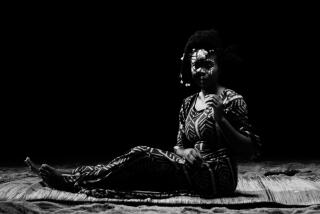Finding a Husband in Botswana : LOVERS OF THE AFRICAN NIGHT<i> by William Duggan (Delacourt Press: $17.95; 230 pp.) </i>
In Africa, marriage is not such a big deal. Of course, your viewpoint on this will alter, as it does on everything else, with the color of your skin. If you’re white, you may be on your second or third marriage; if you’re black, you may well find that even one marriage is not possible. Wars and the mines in South Africa have long since stripped the land of its menfolk and marriage of any practicality.
William Duggan’s novel, “Lovers of the African Night,” has a way of confounding such things: His book is almost all about marriage. The hero, Boko, comes back from the war--not in Angola or Zimbabwe--we’re back in World War II, with strangely modern feelings of Angst about marriage. The home he returns to--a place Duggan rather quaintly calls Kalahariland--is full of women literally starving for men. They bring out their pots and try to cook up husbands. Boko then pursues his aim to become chief of the BaNare tribe, and we move on to a second tribe of women, the Atas. These women, more than just starving for men, have never been able to acquire a single husband among the lot of them. Nor do they produce anything but daughters.
The book takes up the story, told with daunting simplicity, of one of the Ata women who determines to overturn the promiscuous history of her tribe, by marrying. Her aim in life, like her mother’s before her, is, “to love only one man, forever.” Yet she allows herself to be impregnated by the first man who comes along. He abandons her the following morning. Ata takes up her saucepan (having learned to cook with an English madame, whose marriage is in trouble) and sets off to Johannesburg to pursue her lover. She finds and marries him. The marriage fizzles out.
So much for the story. Johannesburg is described in equally simplistic terms: “It was a place of danger, of injustice, of opportunity, mystery and gold.” Duggan takes up none of these themes, however. He places his book in South Africa just long enough to avail himself of one of the major events in South African history--in a place he, not so quaintly, calls, Sharpetown.
Much later in “Lovers of the African Night” Ata’s son, the first Ata male, also stumbles into South Africa. He, too, stays just long enough to figure in another major event in South African political life--the revolt of the children.
Duggan, in his second novel set in Africa, is trying to deal with some of the real changes that have happened in a remote part of Africa called Botswana. He lacks the art that a Dinesen would employ to illuminate her world and, most oddly, he ignores the most obvious and fascinating character at his disposal--Africa. There is no sense of the continent in this novel; Duggan’s descriptive powers never venture beyond compound, clearing, field and village. The characters he does give us are linear, and the intelligence is so thin that even the scent of the plot grows weak. It’s exasperating that such ingredients could end up in such watery stew.
Yet, Duggan, unlike many a colonial before him (he’s an agricultural consultant) has written a book without condescension. He attempts to enter and describe a purely African world, which is, in itself, unusual enough. He doesn’t shove his Africans into a back room and pull them out when servants are needed, and he does make their world credible.
I think what one misses in this novel is range: “Lovers of the African Night” conveys nothing of the uniqueness of Africa nor do we get any new insights into the nature of human beings. It reads rather like romantic fiction, and this, perhaps, is what it is. An inappropriate genre for a continent as mighty as Africa.
More to Read
Sign up for our Book Club newsletter
Get the latest news, events and more from the Los Angeles Times Book Club, and help us get L.A. reading and talking.
You may occasionally receive promotional content from the Los Angeles Times.






